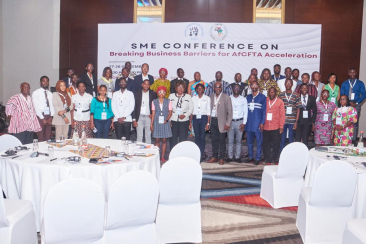
Let’s break barriers to African trade now, SME actors and experts say
The two-day 2023 Regional Integration Issues Forum (RIIF) kicked off today in Accra, Ghana with SMEs and trade experts exploring strategies and concrete actions to overcome trade barriers and increase African market access for SMEs.
The forum convened by The Centre for Regional Integration in Africa (CRIA) and the African Capacity Building Foundation (ACBF) together with the Ghana Institute of Management and Public Administration (GIMPA), with the support of the Afreximbank will discuss the various aspects of SME access to African markets through the Africa Continental Free Trade Area framework.
Dr Nana Owusu-Afri, Chairman of the Afariwaa Group of Companies in Ghana delivered the opening remarks and reminisced about how he started a poultry project in his backyard and grew it to become one of the country’s most prosperous small-scale businesses.
“It is time for SMEs to focus on breaking trade barriers... In most African countries, SMEs are the backbone of economies,” he said. He called on African governments to follow the example of the Jua Kali system in Kenya which has supported SMEs to grow and promote communal development.
In a speech read for him by his Chief of Staff, Mr Silver Ojakol, the Secretary General of the AfCFTA Secretariat, His Excellency Wamakele Mene, said the need to overcome trade barriers needed political will, collaboration and embracing AfCFTA tenets. He said the big corporations all had the numbers to call at borders to avoid the trade barriers, but the SMEs were in trouble because they had no one to call.
“When we were signing the AfCFTA we said the agreement we were creating was not for the big corporations but for SMEs,” he said.
“The journey to the implementation of the agreement is marked by a strong political will by African heads of state and government and the enthusiasm of the private sector to change the destiny of the African people by making the continent an economic powerhouse. The AfCFTA is the first agreement in the world to have entered into force within a year of the signature of the agreement,” Mr Mene noted.
Mr Mamadou Biteye, the Executive Secretary of ACBF pledged ACBF’s continuous support in capacitating all players in the successful implementation of the AfCFTA, in a speech read on his behalf by Mr Ian Mashingaidze, the Head of ACBF’s Western and Central Africa Regional Office.
“ACBF recognizes that without the necessary capacities, African countries and businesses may struggle to fully leverage the benefits of AfCFTA. Therefore, our Strategic Plan 2023-2027 places a strong focus on ‘Trade as an Engine of Economic Development’ and provides targeted capacity building support to governments, policymakers, institutions, and individuals involved in the AfCFTA implementation process,” he said.
Prof. Lehlohonolo Tlou, Executive Director of the Centre for Regional Integration in Africa (CRIA), noted that 6 decades after the establishment of the OAU, AU, regional economic communities (RECs) and the AfCFTA, the continent's intra-African trade is woefully low at 15-16%. The reality is that Africa’s SMEs and private sector operators still 'produce what Africa does not consume and consume what it does not produce'. She said the SME Conference was part of CRIA’s Regional Integration Issues Forum (RIIF), a platform that contributes to raising awareness and building SME capacities to make well-informed choices and actions in support of AfCFTA acceleration of the production of goods and services that meet the consumption needs of African people.
Prof. Samuel Bonsu, Rector, Ghana Institute of Management and Public Affairs (GIMPA) underscored the fact that Africa has the youngest population and the need for intra-Africa trade to transform resources into better value could not have come at a better time.
The second day of the forum is designed as a training workshop for 60 selected West African SMEs in the AfCFTA priority sectors of trade in goods and trade in services. The training aims to raise awareness of the AfCFTA strategy for private sector engagement; deepen capacity of SMEs to understand how to leverage opportunities offered by the AfCFTA; and prepare African SME leaders to expand their businesses through regional value chains.
------------ENDS----------
For more information contact:
Tsitsi Chakonza – [email protected]





